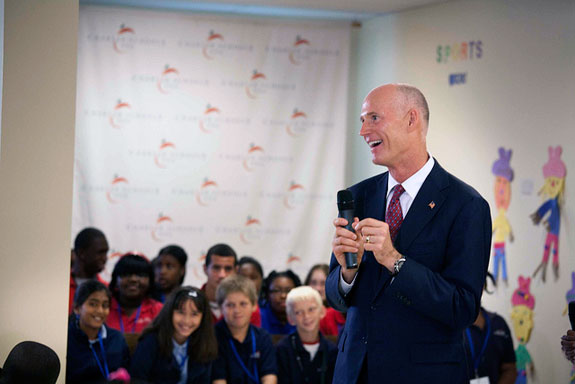
After spearheading Florida's education overhaul, Gov. Rick Scott faces his lowest approval ratings. (Photo courtesy of Rick Scott.)
By Ralph De La Cruz
Florida Center for Investigative Reporting
When state legislators earlier this year approved an eight percent cut in school funding — more than $500 per student — everyone knew there would be repercussions. But where and how and for whom?
On Wednesday, a slew of troubling education stories in newspapers across the state began to tell some of the story.
In Central Florida’s Seminole County, the school district is in “crisis,” facing the possibility of cutting sports, music and the arts. Perhaps going to a four-day week.
Seminole County school officials are considering a property tax increase of $1 for every $1,000 of valuation. That would be a $250 tax increase if you own a $250,000 home. Remember the $44.72 in property tax cuts that the average Floridian was supposed to receive in exchange for state cutbacks in jobs and services? Well, if you’re a homeowner in Seminole County, that probably doesn’t seem like such a great deal these days.
In Manatee County, south of Tampa Bay, administrators will face 5 percent pay cuts. Principals and assistant principals will face 3 percent cuts, and teachers will lose 2.75 percent. And that’s on top of increases in health insurance costs and the mandated three percent contribution to their pensions.
“That’s a $400 to $500 difference for me,” one middle school teacher told the Bradenton Herald. “I have a family of four, and I will make a whole lot less than when I started.”
The district will also cut 28 positions.
In Northeast Florida, the Duval District is struggling to control four low-performing schools, which could be taken over by a for-profit group for $2.1 million a year.
And the Miami-Dade district is doing everything it can to hold onto two high schools that are symbols of the city: Miami Edison and Miami Central. In March, President Barack Obama cited Central as a national model for education reform. But it didn’t meet No Child Left Behind standards.
Florida isn’t the only place going through major changes in education.
Education Week reports that the Sunshine State is one of about a dozen states that have legislated serious educational changes since January that fundamentally alter education — including how teachers do their jobs.
The states are pushing for vouchers, charter schools and online courses and to do away with teacher tenure.
Meanwhile, Gov. Rick Scott, who spearheaded Florida’s education overhaul, sees his poll numbers continue to dive. And that’s despite a month of robocalls asking voters for support.
After a Quinnipiac University poll in May showed Scott’s approval rating at a ridiculously low 29 percent, it didn’t seem he could fall further. But poll results released Wednesday by the right-leaning Sunshine State News shows he is now at an abysmal 27 percent.
And the percentage who disapprove of his job performance (58 percent) has now moved past the halfway point towards the two-thirds mark.
